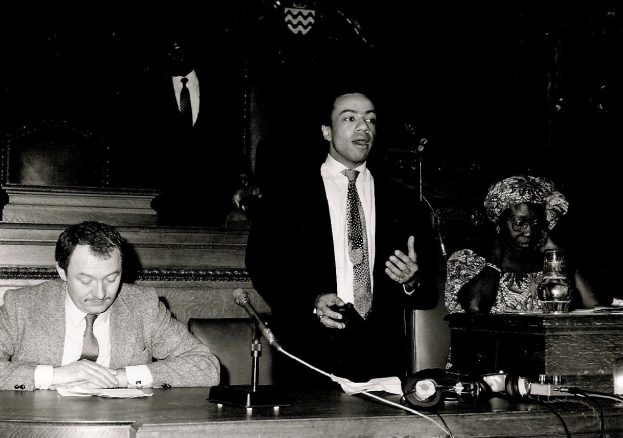
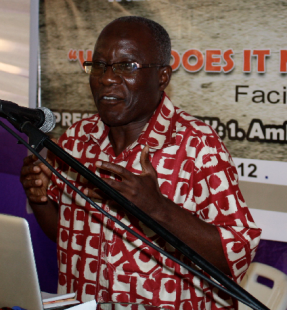
Patrick Vernon interviews Akyaaba Addai-Sebo the architect of Black History Month in the UK
PV- How was Black History Month first started in the UK?
AS: I was stirred up in the mid-1980s by the identity crisis that Black children faced as some brazenly would not identify with Africa and shrank when called an African. A colleague came to work one morning broken hearted and in probing her why revealed to me in confidence that her seven year old son, who she had proudly and purposefully named Marcus, after Marcus Mosiah Garvey (a foremost Black nationalist leader), before going to bed, had asked her: “Mom, why can’t I be white?”. In consoling this devastated mother I was prompted to go around asking questions about “identity” and to observe and talk to children more after school, in buses, parks, and in the play grounds in the communities in some parts of London. I was awakened to the fact that even some Ghanaians tried to mimick being Afro-Caribbeans and some Afro-Caribbeans would take offense being referred to as “African”. A crisis of identity faced us squarely despite the Race Awareness campaigns of the Greater London Council (GLC) and the Inner London Education Authority (ILEA). I also worked then as the Special Projects Coordinator of the Ethnic Minorities Unit of the Greater London Council. More had to be done and so I conceived an annual celebration of the contributions of Africa, Africans and people of African descent to world civilization from antiquity to the present and got a lot of support from the leadership of the GLC and ILEA and most especially from Mr. Ansel Wong, Head of the Ethnic Minorities Unit and the leader of GLC, Mr. Ken Livingstone.
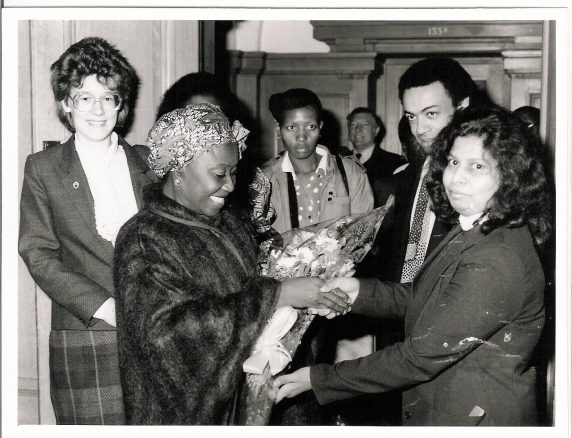
PV: Why was October chosen to celebrate Black History Month?
AS: There is historical link to Black History Month as celebrated in the US in February because of the inspiration of Dr. Carter G. Woodson who set it up there. We drank from the cup of Dr. Woodson but decided on a particular period of the year that will engage most the minds of children and youth in the UK. We settled on the propitious month of October when the weather was not cold and children were fresh after the long summer vacation and had less to worry about exams and tests and the camaraderie was stronger as they shared experiences. We believed that they would absorb more if their living environment buzzed with positive vibes, instructions and images about themselves and their origins, thus celebrating who they are as “Africans” who gave the world the concept of monotheism (the worship of a one and only God); who helped to install the first electric lighting system in London, Amsterdam and New York, in the person of Lewis Latimer, a pioneering partner of Thomas Edison and Nikola Tesler (credited with lightning the world) and many more. October in the UK as February in the US is to inculcate self-pride and especially in children. Self-pride is the catalyst for achievement and there is no greater “truth” than knowing yourself.
PV: What was the context of context of you coming to Britain and establishing Black History Month?
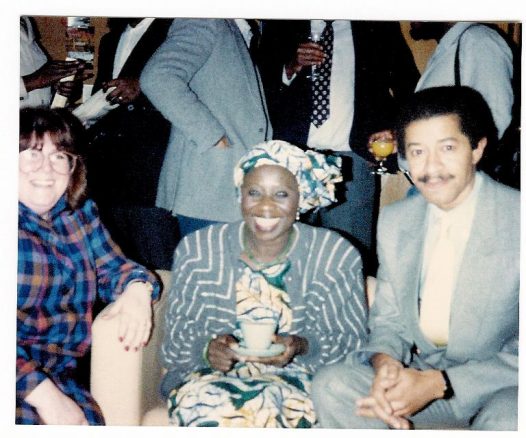
AS: I came to the UK to seek refuge from political persecution in Ghana during the regime of Jerry John Rawlings in January 1984. A death squad had been sent after me but I escaped their detection and was declared a WANTED MAN. The People’s and Workers’ Defence Committees at that time protected me and prepared my escape after three weeks of hide and seek with the security agencies. I settled in London with my wife, Nana Akua Owusu, who had arrived before me. We lived in the company of Pan-African intellectual giant, CLR James and his nephew, Darcus Howe, black activist who run the Race Today collective. I was therefore absorbed in community activism right on my arrival. I was in an elevating company with my strategic position as coordinator of special projects at the Greater London Council and Chairman of the African Refugees Housing Action Group within a year of my arrival and later Operations Manager of the Notting Hill Carnival. We were at the forefront of the campaigns against institutional racism in the UK and the apartheid regimes in Southern Africa. My vantage position in the administration of the city of London enabled us to invite into our community personalities like Sally Mugabe, Graca Machel, Winnie Mandela, Nina Simone, Angela Davis, Rev. Jesse Jackson, Max Roach, Hugh Masakela, John Henrik Clarke, Frances Cress-Welsing, Tony Martin, Yosef ben-Jochannan, Mawulena Karenga, Grand Ballets d’Afrique Noire, Ray Charles, and many more to inspire, educate and help in the in the intellectual preparation of our community for the future safety and development of Africa in our collective interest. There we reembracing arms and minds that made my sojourn in the UK so full of meaning and fulfilling service.
PV: Do you think Black History Month should change and it’s timing?
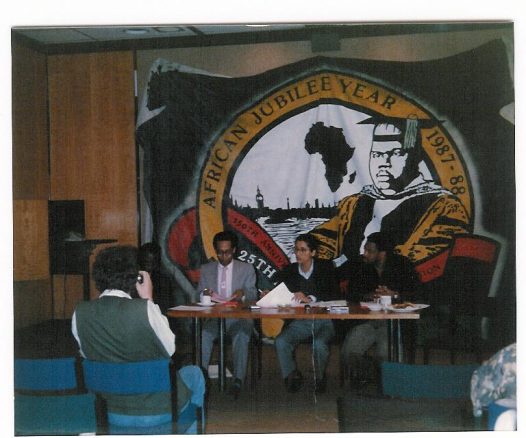 AS: There has been no change from Black History Month to African History Month. Our original goal was to first create an enabling cultural space in the UK celebratory calendar and after public acceptance and recognition extend the month from October to December to encompass Kwanza and call the period Black History Season with the symbioses with the Woodson and Karenga creation in the US remaining. However there emerged an insignificant opposition to Black History Month being celebrated in October and their call was for it to be moved to February in as in the US. I deflated their logic by asking them why are they then not asking for carnival celebrated in August in the UK to be moved to February as celebrated in Brazil and Trinidad and Tobago? These small opposing activists were piqued by the fact that I came, promoted and got instituted an idea which they felt should have come from them. I buried them with the aphorism that Black History Month is African History Month as African History Month is Black History Month and with a wreath quoting Peter Tosh thus “No Matter Where You Come From So Far As You Are Black You Are An African”
AS: There has been no change from Black History Month to African History Month. Our original goal was to first create an enabling cultural space in the UK celebratory calendar and after public acceptance and recognition extend the month from October to December to encompass Kwanza and call the period Black History Season with the symbioses with the Woodson and Karenga creation in the US remaining. However there emerged an insignificant opposition to Black History Month being celebrated in October and their call was for it to be moved to February in as in the US. I deflated their logic by asking them why are they then not asking for carnival celebrated in August in the UK to be moved to February as celebrated in Brazil and Trinidad and Tobago? These small opposing activists were piqued by the fact that I came, promoted and got instituted an idea which they felt should have come from them. I buried them with the aphorism that Black History Month is African History Month as African History Month is Black History Month and with a wreath quoting Peter Tosh thus “No Matter Where You Come From So Far As You Are Black You Are An African”
PV: You now live in Ghana what is the impact of Black History Month on the continent?
AS: The significance of Black History Month to African continent lies is in the fact that a renaissance in African values and lifestyles in the diaspora will facilitate a “Back to Africa” consciousness reminiscent of the Back To Africa movement of Marcus Mosiah Garvey in the first part of the 20th Century. It is this aroused consciousness that will stimulate skilled professionals to return to Africa to contribute to the developmental process in order to remove the scourge of underdevelopment, civil war and poverty that fill the television screens, newspapers and magazines of the western world which causes our children and youth to shrink away from themselves when confronted with such disturbing images. Unfortunately it is only in Ghana that I know of where the British Council sponsored Black History celebrations but this initiative has been curtailed in favour of the promotion of Black Youth Entrepreneurship.
PV: How would you describe your legacy of Black History Month in the UK?
AS: This year marks the 30th Anniversary of Black History Month in the UK .After the sowing of Black History Month in the communities, educational, public and private institutions in the UK and as it sprouted my catalyzing role as an enzyme came to an end and I pulled back and rather encouraged others to take on the mantle and run with it.
